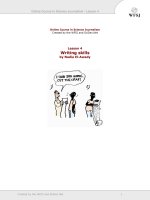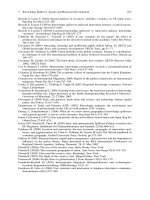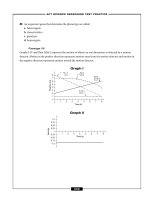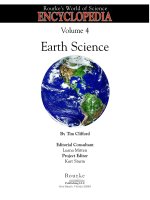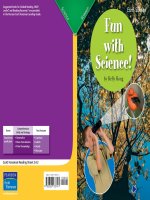4 SCIENCE
Bạn đang xem bản rút gọn của tài liệu. Xem và tải ngay bản đầy đủ của tài liệu tại đây (52.93 KB, 3 trang )
SCIENCE (TOPIC FOR ALL TESTS DATES TILL 30TH APRIL 2022)
I. VOCABULARY
➢ science
➢ a discipline
➢ fields of study
➢ subject areas
➢ scientific methods
➢ a branch of knowledge
➢ to do research
➢ to conduct an experiment
➢ by trial and mistake
II. QUESTION
1. Do you like science?
Did you like science classes when you were young?
a. IDEAS
reasons to like science:
➢ it covers a variety of research areas
➢ it is what lets us make progress as a race
➢ it has the ability to make the world make sense
➢ it makes me push my understanding and want to know more about everything
➢ its clarity is addicting
➢ it's boderless
➢ it can explain everything in life
➢ it allows people to know where things come from
➢ it is all about learning how things work
➢ there is always something new to discover
➢ it defines us, our world and our universe
➢ it is the essence of what defines us as humans
➢ it is the best tool for answering questions about the universe
➢ there can be no true understanding of nature or ourselves without it
reasons not to like science:
➢ it is full of math which I am not good at
➢ scientists are pessimistic and skeptical doubters
➢ it is challenging as it requires dedication, attention to detail and discipline
➢ it is not easy
➢ I don't understand it
➢ it requires repeated trial and error, which I don't like
➢ it was taught poorly in my school, which killed my interest to it
b. ANSWER
Do you like science?
-Of course I do. Science is what lets us make progress as a race, it is something
never-ending and so really addicting. It defines us, our world and our universe,
allows us to know where things come from and explains absolutely everything in life.
This is why I adore it.
Do you like science?
-Oh no, I don't like it at all. It is full of math which I am not good at and requires
repeated trial and error, which I don't like. I think scientists are pessimistic and
skeptical doubters, and I just don't want to be like them.
Did you like science classes when you were young?
-No, I didn't. To my regret science was taught poorly in my school, which just killed
my interest to it. Only many years on did I understand how important these classes
could be but it was too late.
2. Do you think schoolchildren should have both science classes and art
classes?
a. IDEAS
yes:
➢ science classes teach kids:
➢ about life
➢ about the way the world works
➢ to form their own opinions rather than take those of others for granted
➢ science classes help kids
➢ think what could happen before they do it
➢ create a hypothesis in their mind
➢ form a healthy dose of skepticism
art classes:
➢ improve kids' motivation, concentration, confidence and teamwork
➢ connect kids more deeply to the world
➢ open kids to new ways of seeing
➢ promote activity in the brain
➢ nurture inventiveness that aids in the development of self-esteem, selfdiscipline, cooperation and self-motivation
➢ strengthen problem solving and critical thinking skills
b. ANSWER
Do you think schoolchildren should have both science classes and art classes?
-I'm sure that kids need to study both science and art because they are equally
important for kids' development. Science classes teach children about the way the
world works and help kids create a hypothesis in their mind as well as form a healthy
dose of skepticism. While art classes connect kids more deeply to the world opening
them to new ways of seeing, promoting activity in their brain and nurturing
inventiveness that aids in the development of self-esteem, self-discipline,
cooperation and self-motivation. So definitely both are important.
3. Do you think science is important to our society?
a. IDEAS
yes:
➢ science is important as it:
➢ is everywhere in today’s world
➢ is part of our daily lives
➢ allows us to define, investigate and try to understand the world we live in and
how it works
➢ helps us understand the role that humans play in the environment (how we
have impacted it and how we can save it)
➢ allows us to protect ourselves from the environment and vice versa allows us
to protect the environment from our impact
➢ transforms our world at an incredible pace
➢ trains people to think critically (teaches to examine a problem, consider many
alternatives and devise a strategy for finding the answer)
➢ allows us to enjoy everything that we use in our day to day lives from the
clothes we wear to the electronics we use
➢ pushes back the boundaries constraining our knowledge
➢ provides the potential for long-term benefit worldwide
b. ANSWER
Do you think science is important to our society?
-No doubt it is. It is part of our daily lives. It is something that pushes back the
boundaries constraining our knowledge and transforms our world at an incredible
pace. What is more, science allows us to define, investigate and try to understand
the world we live in and how it works as well as provides the potential for long-term
benefit worldwide.

